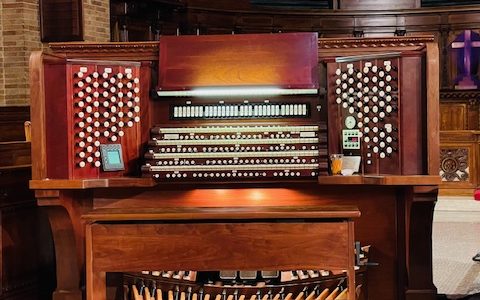Gail Archer delivers an excellent selection of organ music, highlighting Bach’s influence on the classical music world. But what is B.A.C.H. an acronym for?
At 6 pm on Thursday, March 28, the high ceilings of St. Paul’s Chapel once again resonated with organ music.
Entitled B.A.C.H., the concert was performed by Gail Archer. Archer is an international concert organist, recording artist, and the conductor of our very own Barnard-Columbia Chorus. She was also the first American woman to play the complete works of Messiaen, which, if you remember my last article, is no small feat.
Bach is considered a titan of the classical world, a prodigy beyond measure. His large repertoire of fantastic organ music makes him a popular choice when programming an organ concert. But Archer didn’t just throw Bach into the program but rather designed it around his music.
The program began with a prelude and fugue by Bach and then continued with tributes to the composer from those who came after, namely, Fanny Mendelssohn, Hensel’s Prelude in F Major, and two pieces by Johannes Brahms. These, however, were only tributes to Bach in musical style, and the rest of the program took it to the next level.
Schumann’s Fugue uber BACH, nos. 5 & 6, were written both in the musical style of Bach and were composed using only four notes: B, A, C, and H. (To those familiar with the scale, note that these are in German, where B is actually B-flat, and H is B-natural.) Archer then concludes the program with two pieces by Franz Liszt: Consolation and Fantasie & Fugue on BACH. The latter, once again, uses only four notes and is written in Bach’s style.
Archer’s programming choices were precise, conveying Bach’s lasting impact on the classical music world. Of course, the program wouldn’t have had the same impact if she weren’t also a phenomenal organist. Her virtuosic playing brought out not just Bach’s influences on the rest of the program, but also the differences in compositional style between each piece. The inclusion of Liszt’s ethereally beautiful Consolation, which isn’t a tribute to Bach’s music, brought a romantic flair to the concert, and its place as the penultimate piece in the concert highlighted the evolution of classical music from Bach’s time to Liszt’s. I’m excited to see what Archer does next!
This performance was part of a series of performances at St. Paul’s Chapel by Sacred Music at Columbia. A full recording of the performance can be found here, and a schedule for all of this semester’s performances can be found here. To learn more about Gail Archer’s work, her MPP bio can be found here.

Organ via Author


 1 Comments
1 Comments
1 Comment
@Anonymous if you had showed up on time you would have known she explained the B.A.C.H at the beginning which is actually how the program started ;/